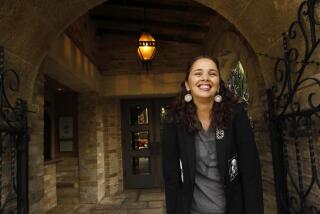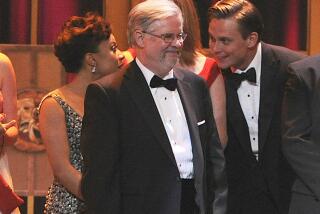Athol Fugard: The Writer as âTigerâ Cub
LA JOLLA â In âThe Captainâs Tiger,â the great South African playwright Athol Fugard tries once more to tell the first story he ever attempted to weave in writing. His failure to tell it initially, we learn, is the very impetus for all the stories he did go on to tell--the beautiful, bleak and unblinking plays that told the world about South African apartheid and what it meant to the lives of individual human beings.
âSizwe Bansi Is Dead,â âBoesman and Lena,â âMaster Harold . . . and the Boysâ--all of those plays were penance, he says, because he let this first story go untold.
Onstage at the La Jolla Playhouse, where âThe Captainâs Tigerâ opened on Sunday, Fugard, 66, plays himself at age 20, when he went to work aboard a tramp steamer, hauling salt from Africa to Japan, sugar from Fiji to the British Isles. Fugard signed on as the captainâs tiger, a kind of personal assistant who gets breakfast for the head man and makes sure his shoes are shined. From the looks of it, it was a good job, because Fugard never works.
In the play, the young Fugard spends all his time writing his first novel, talking to that storyâs female heroine, Betty (Felicity Jones), and to a Kenyan sailor called Donkeyman (Tony Todd), who comes upstairs drenched in sweat from his considerably less cushy job in the engine room.
Ironically, Fugard still seems unwilling to fully tell that first story. Betty is his mother, who in real life went on to marry his father, a bitter, crippled piano player who checked out of all family responsibility and left Betty to work her youthful energy prematurely to the bone. Instead, Fugard focuses on romantic musings of what his mother might have been like when she was a lovely young woman in a white dress, before she got stuck being his mother. And when he is finally forced to admit the bleak truth of his parentsâ lives, he cannot do it quickly enough.
Which, as depicted here, was exactly his problem starting out as a novice novelist. In the play, Betty comes alive off the page and talks back to him, complaining that the life heâs painting for her is âfalse, exaggerated and improbable.â He has imbued her with âstrange yearnings,â she complains, and then wonât let her make love to the piano player who catches her eye. He is mortified when she guesses why he is steering clear of sex scenes: He is a virgin and doesnât know how to describe the act.
*
A trip with Donkeyman to a Japanese whorehouse fixes that writerly problem. But a psychological block still remains. He wants, in his novel, to give Betty a handsome dancing partner; she longs for the crippled piano player. Fugard has seen where that will lead; he doesnât want to go there.
In the conversation between Betty and his young self, Fugard gives us a window into the mind of a writer who must confront his own evasions in order to write. And yet âThe Captainâs Tigerâ does not seem like an especially frank work. The relationship, for instance, between the young Fugard and Donkeyman is almost shockingly underwritten. When the large, brooding black man first enters Fugardâs chamber, he brings with him a tantalizing sorrow, an unavoidable Otherness with which the small, white Fugard must deal. But in just a sentence or two, the men are the best of friends, exchanging favors and compliments in pidgin English that makes Donkeyman sound like a pet. âTiger no like jiggy-jiggy?â asks Donkeyman, on his way to a whorehouse. âWhen Tiger write, Donkeyman feel proud.â
Their relationship continues on, remarkably polite and conflict-free, until one day when young Fugard is fed up with his writing and snaps at Donkeyman, hurting his feelings. The moment is a dim, dim echo of the pivotal moment in Fugardâs 1982 play, âMaster Harold . . . and the Boys,â when Hally yells at Sam, but without any of the build-up or resolution.
âThe Captainâs Tigerâ is directed by Fugard and Susan Hilferty, who also designed the sets and costumes. Despite the disparity between his own age and that of the character he portrays, Fugard appears sprightly and avuncular, both young and old. He paints his youthful self as a man pretty damned pleased with the sounds of his own prose, who never gets tired of reading it aloud. The playwright never makes any judgments about the work of the journeyman novelist, but we hear enough of the book to know that his abandonment of it was not a blow to world literature. âGone was the country girl of a year ago. Staring from the mirror was a beautiful young woman, her smooth white shoulders and neck gleamed like polished alabaster,â that kind of thing.
In âThe Captainâs Tiger,â Fugard sets the stage to address his long-ago failure of nerve, and then politely declines. When Eugene OâNeill revisited the home his parents built, he gave us âLong Dayâs Journey Into Night,â a searing adult appraisal of what the boy could only guess at. Fugard instead gives us just an amiable exercise in nostalgia.
(BEGIN TEXT OF INFOBOX / INFOGRAPHIC)
âThe Captainâs Tiger, A Memoir for the Stage,â
La Jolla Playhouse, Mandell Weiss Theatre, La Jolla Village Drive and Torrey Pines Road, Tue.-Sat., 8 p.m.; Sun., 7 p.m.; Sat.-Sun., 2 p.m. Ends Aug. 9. $21-$39. (619) 550-1010. Running time: 2 hours.
Athol Fugard: The Author
Tony Todd: Donkeyman
Felicity Jones: Betty
A La Jolla Playhouse production. By Athol Fugard. Co-directed by Athol Fugard and Susan Hilferty. Sets and costumes Susan Hilferty. Lights Malcolm Sturchio. Original lighting Dennis Parichy. Music composer and arranger Lulu van der Walt. Sound Tony J. Martin. Stage manager James T. McDermott.
*
* BURDENED BARD: Boisterousness offstage, stiffness onstage hamper âAs You Like Itâ at San Diegoâs Old Globe complex. F3
More to Read
The biggest entertainment stories
Get our big stories about Hollywood, film, television, music, arts, culture and more right in your inbox as soon as they publish.
You may occasionally receive promotional content from the Los Angeles Times.










